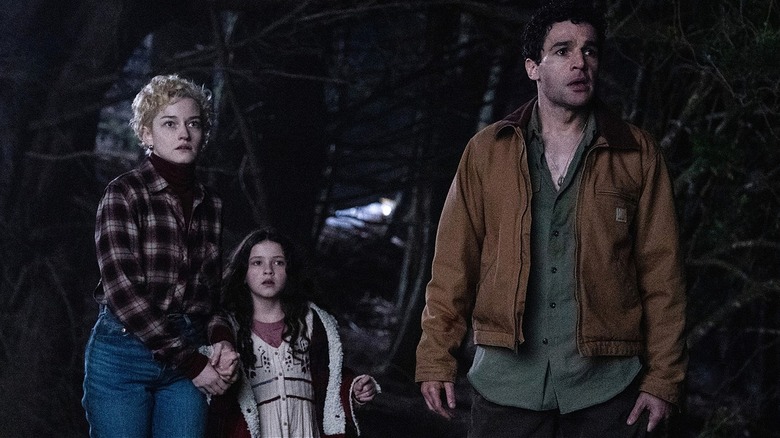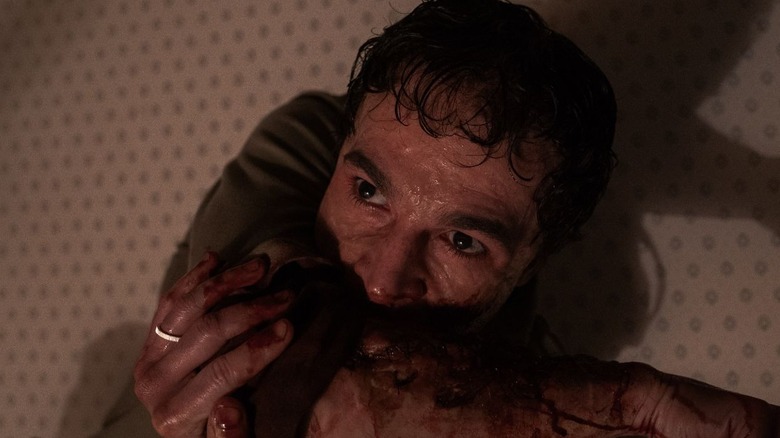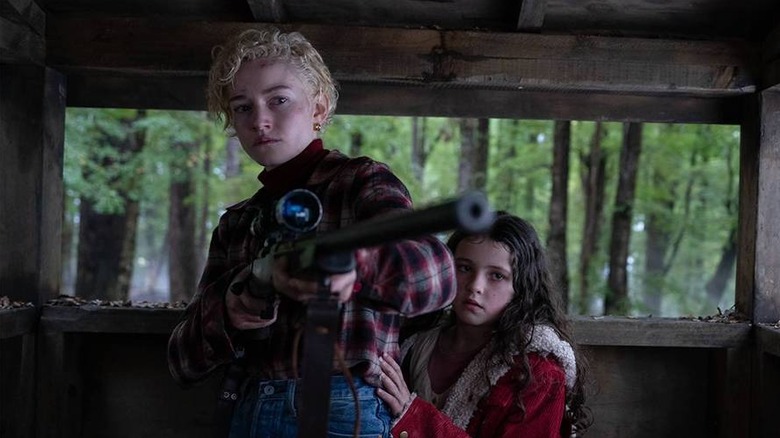Wolf Man Review: Leigh Whannell's 2025 Horror Reboot Could Use More Bite
- Frightening transformation effects
- Attempts at thematic depth fall flat
"Better than 'Night Swim' but less entertaining than 'M3GAN'" isn't the worst place for a January Blumhouse horror movie to rank, but the new "Wolf Man" is just good enough that it becomes disappointing that it's not better. This is writer-slash-director Leigh Whannell's second go-round with a gritty R-rated reboot of one of the classic Universal Monsters, following "The Invisible Man" in 2020. However, where "The Invisible Man" proved successful as both a jump scare-filled thrill ride and as an exploration of gaslighting and abusive relationships, "Wolf Man" delivers some impressive moments of slow-burn body horror but falls short compared to the narrative and thematic cohesion of its predecessor.
Not that there isn't an effort at touching on deeper themes. The first act spells out that this is a movie about parenting and generational trauma. Blake (Christopher Abbott) is returning to the home of his recently-pronounced-dead father (Sam Jaeger), whom he has complicated feelings about. He's trying to be a better father to his daughter Ginger (Matilda Firth) — especially since his career-focused wife Charlotte (Julia Garner) feels no confidence about her own parenting — but is aware that his own parental protectiveness could be its own danger. Whannell and Corbett Tuck's script is very direct in stating these themes; they're lucky most of the film's conversations involve explaining these concepts to an 8-year-old girl so being on-the-nose isn't necessarily unrealistic. Still, that telling-over-showing nature — and the lack of cleverness or satisfying payoff when the film enters action mode in the third act — might be part of the reason why this "Wolf Man" doesn't leave the emotional impact you want it to.
The writer of Saw knows how to make you squirm
The first reveal of the new "Wolf Man" design via a Universal Studios theme park costume did not go over well at all. Fortunately, the monster in the film looks way better than the off-model rubber mask version, but if that theme park reveal is to prepare you for anything, it's that you're not getting a "cool" or "fun" werewolf this time around. The makeup effects lean more man than wolf, and the man in "wolf" form is deliberately repulsive. It's not a perfect comparison, but to get across the extent of the contrast, let's just say that Christopher Abbott's Wolf Man is to the Lon Cheney and Benicio Del Toro versions what Bill Skarsgård's Count Orlock in "Nosferatu" is to the Bela Lugosi and Christopher Lee versions of Dracula.
In a way, Leigh Whannell's "Wolf Man" is less a remake of previous "Wolf Man" movies than it is a lupine-themed twist on David Cronenberg's 1986 version of "The Fly." The monster transformation isn't a sudden shift in the full moon but something slow and painful, each gruesome contortion further distancing Blake from his humanity while paralleling the all-too-human experience of dying from disease. Abbott does a good job acting through his prosthetics, and the body horror reaches some truly sickening levels with incredible gore effects. One word to serve as a warning to the sensitive and a selling point to the sickos: autocannibalism. Two more words: "Saw" reference (Whannell wrote the first three "Saw" movies, so he's self-referencing here).
Perhaps the movie's most haunting effect isn't one of the gory ones at all, but instead when the film switches to Blake's own perspective during his transformation. When Charlotte and Ginger speak to him, he can no longer understand what they're saying — but his human mind is still active wanting to communicate with his family, making him feel helpless and trapped by this curse of incomprehensibility. This "wolf-vision" is such a strong, scary concept that its repeated use throughout never wears out its welcome.
The final act underwhelms
After the slow burn of the first act's exposition and the second act's transformation, "Wolf Man" picks up the action in act three. But even with its monster battles and heightened familial tensions, this third act only heightens the feeling that not enough is happening in this movie. Of course, the monster plot connects back to the family plot, but the connection lacks the satisfaction of a great reveal.
For one thing, the connection is too obvious to be a surprise (take three guesses about the identity of the Wolf Man that bit Blake and the last two don't count). But the bigger problem is that it makes this reveal and ... that's it. No deeper exploration of the big metaphor, no real complications for what it means for this kind of man to become that kind of monster, just the humorless version of a [BRAND NAME WITHHELD TO AVOID THE OBVIOUS SPOILER] auto-insurance commercial. The fears of repeating the mistakes of the past don't come about through any sort of bad decisions or deeper character motivations, but just because ... that's what happens when the past is a werewolf.
There's just not a lot to say about this "Wolf Man" because the movie itself isn't saying much. It expresses earnest fears about parenthood, but without the thoughtfulness to make much of an intellectual impression or the dramatic strength to make much of an emotional one. Even the set-ups and payoffs that should work end up feeling muted. It gets a passing grade because it succeeds at being scary, and it's paced well enough that its slowness heightens the fear without turning to boredom. But it's disappointing that it can't achieve more, the way "The Invisible Man" did.
"Wolf Man" opens in theaters on January 17.


